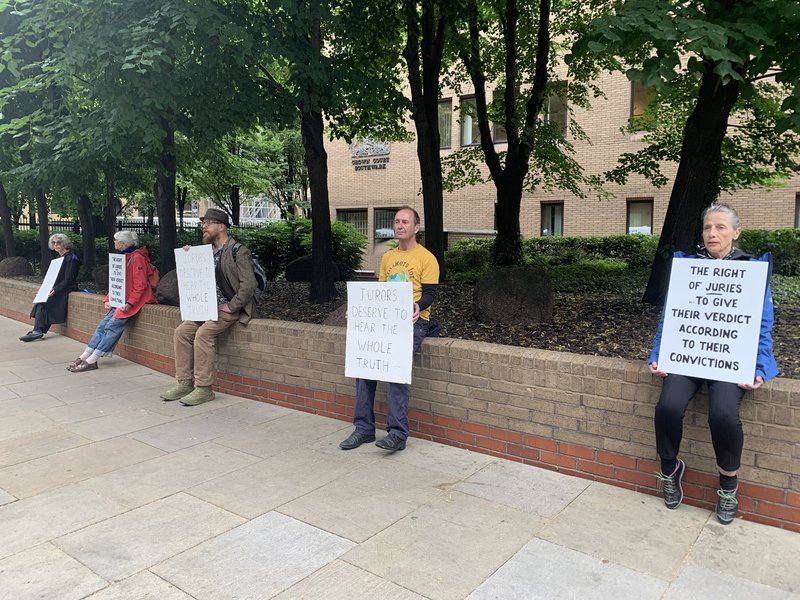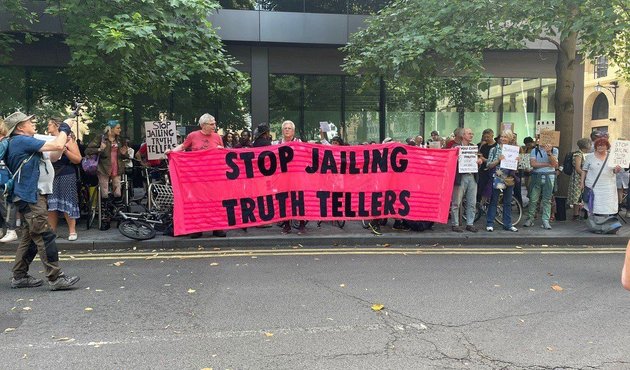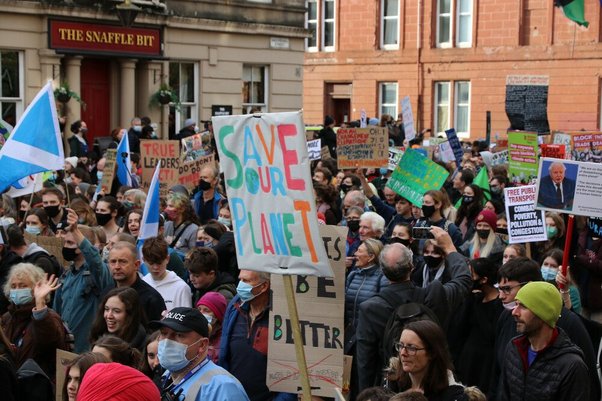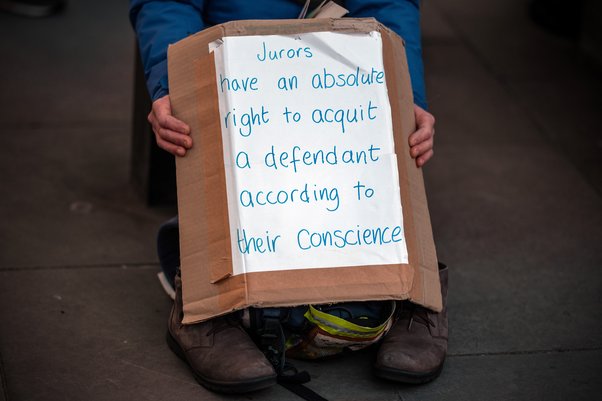Thirty-eight-year-old Daniel Shaw, a softly spoken social worker, will spend the next four years in prison. His crime? Leading a Zoom call about a climate protest.
Daniel is one of five Just Stop Oil activists sentenced today under one of Britain’s draconian new protest laws criminalising civil disobedience. The activists were found guilty of conspiring to obstruct the M25 in October 2022.
They were given some of the harshest prison sentences ever for a peaceful protest in the UK.
Their case is the latest in a disgraceful crackdown in the UK on people peacefully campaigning against the climate emergency.
For the past decade, Global Witness has documented abuses and killings of environmental defenders around the world.
Until now, most of our attention has focused on people speaking up against powerful interests in Global South countries, where a defender is killed every other day for protecting their land and environment.
But as the climate crisis jeopardises communities and lives around the world, activists are finding themselves demonised, threatened, and even jailed much closer to home.
Now, the UK is becoming one of the most dangerous countries in the western world to speak up in defence of our planet.
For the past two weeks, we’ve been in court to monitor Daniel’s case. The authorities’ disdain for peaceful protest has been on full display.
A band of protesters hoisting placards outside Southwark Crown court that urged jurors to “vote with their consciences” were bundled away by police on orders of the presiding judge.
Throughout the trial, Judge Christopher Hehir repeatedly described these protesters as “troublemakers” and prevented the defendants from speaking about the climate crisis in court.

Climate protestors outside Southwark Crown Court
Over several chaotic days of testimony, the defendants were arrested and carried out by police for defying the judge to speak about climate change.
More than 7,000 climate protesters have been arrested in the UK since 2019, according to data from the Metropolitan Police.
Nearly 900 people have been arrested for “slow marching” alone since it was made an explicit offence last year.
The two draconian laws enabling many of these arrests – the Public Order Act 2023 and the Police, Crime, Sentencing and Courts Bill 2022 – have vastly expanded police powers and undermined the right to protest.
Daniel and his co-defendants were convicted under the latter, despite their protest never going ahead.
As part of these new laws, the previous government redefined “disruption” as anything that caused “more than minor” disturbance.
The former Home Secretary overruled objections to this from the House of Lords using so-called Henry VIII powers – controversial clauses that enable ministers to amend an Act of Parliament without needing Parliamentary approval – a decision which the High Court has since declared unlawful.
More than 7,000 climate protesters have been arrested in the UK since 2019
Following his arrest in November 2022, Daniel was locked up for nearly four months without bail. Many other climate activists have also been slapped with extreme bail conditions, including curfews and ankle monitors, or held in remand to prevent them participating in further demonstrations.
It is simply astonishing that such actions are taking place in an established democracy. Why are we filling our jam-packed prisons with people trying to defend the planet?
According to UN Special Rapporteur Michel Forst, the UK is experiencing the biggest crackdown on peaceful protest since the 1930s.
Mr Forst, who attended part of the trial, has received a growing number of complaints about the treatment of climate defenders here in the UK. He said it is “concerning and disappointing” that the UK has not meaningfully replied to his letters about Daniel’s case.
Among 12 complaints published on the Special Rapporteur’s website, only three have been ignored by their recipients. Two of these were directed to the United Kingdom, which has yet to provide a substantive response.
It is simply astonishing that such actions are taking place in an established democracy. Why are we filling our jam-packed prisons with people trying to defend the planet?
In a ruling about the case last week, Judge Hehir described the Special Rapporteur’s views on the trial as “having no more relevance than the views of any other observer, well-informed or otherwise.”
The mass arrest of activists is not only incompatible with our human rights commitments but undermines action on the climate crisis at a time when we can ill afford it.
It threatens to undermine the UK’s international reputation, opening the floor to further accusations of hypocrisy when condemning human rights abuses abroad.
Shamefully, the UK has tumbled to the lowest in Western Europe in international rankings on freedom of expression.
The fossil fuel industry has played a murky role to help criminalise climate defenders. Oil companies have worked with authorities to enforce civil injunctions that prevent activists from accessing fossil fuel infrastructure.
Last year, oil giant Shell launched a $2.1 million lawsuit against Greenpeace for protesting on their property in the North Sea.
Investigations have shown that a right-wing lobby group partly funded with oil money helped draft the very legislation used to muzzle Daniel.
Our research found that fossil fuel lobbyists met with government officials every single working day last year, on average.
As Daniel and his co-defendants said in their defence, civil disobedience has a long and established history of provoking social change. From the Suffragettes to the civil rights movement, protesters who disrupt and upset have altered history for the better.
At the time, however, these protesters were widely derided as “troublesome” and “counter-productive”.
But whatever you think of the tactics of climate activists, peaceful demonstration should not be a crime. People like Daniel should not spend years in jail for discussing plans to make people late for work.
Now, the new Labour government has an obligation to right these wrongs. Prime Minister Keir Starmer has promised to take bold action on the climate crisis, and the scale of Labour’s victory gives him an unprecedent mandate to do so.
This must include scrapping or amending laws that criminalise peaceful protest and curbing the political influence of the oil and gas industry.
Anything short of this will bring continued shame to the United Kingdom.
This article was corrected on 18th July 2024. It previously stated that the climate protest in question never happened. This was incorrect.



